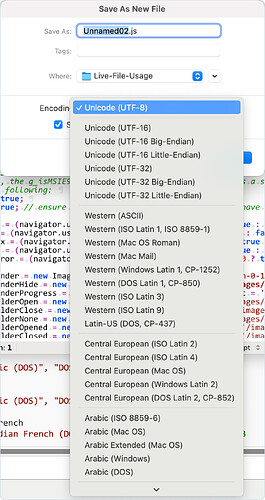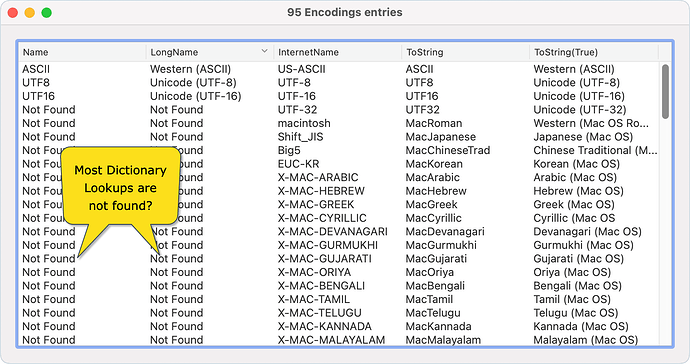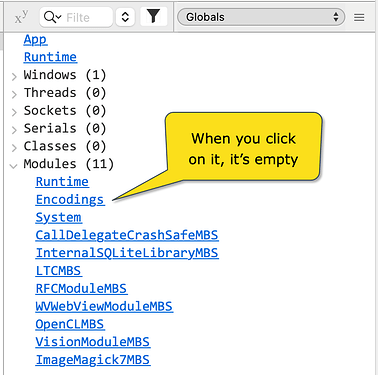In case anyone needs a readable descriptive name for an encoding other than what the InternetName can provide, I researched and put together what I believe to be the “common” descriptive names for the Encodings enum that Xojo supports.
Lower down in my post is a TextEncoding Extension Method to get the enum name or the “longName” (descriptive label). As well, there is a screenshot of how a drop-down of encoding choices could look.
Maybe this information is already available in the documentation (or from another single source elsewhere on the net), but if so, I couldn’t find it.
| Encodings enum item | Code value | Descriptive label |
|---|---|---|
| ASCII | 1536 | Western (ASCII) |
| DOSArabic | 1049 | Arabic (DOS) |
| DOSBalticRim | 1030 | Baltic (DOS) |
| DOSCanadianFrench | 1048 | Canadian French (DOS) |
| DOSChineseSimplif | 1057 | Chinese Simplified (GBK, CP-936) |
| DOSChineseTrad | 1059 | Chinese Traditional (Big 5) |
| DOSCyrillic | 1043 | Cyrillic (DOS) |
| DOSGreek | 1029 | Greek (DOS) |
| DOSGreek1 | 1041 | Greek (DOS Greek 1) |
| DOSGreek2 | 1052 | Greek (DOS Greek 2) |
| DOSHebrew | 1047 | Hebrew (DOS) |
| DOSIcelandic | 1046 | Icelandic (DOS) |
| DOSJapanese | 1056 | Japanese (Windows, DOS) |
| DOSKorean | 1058 | Korean (EUC) |
| DOSLatin1 | 1040 | Western (DOS Latin 1, CP-850) |
| DOSLatin2 | 1042 | Central European (DOS Latin 2, CP-852) |
| DOSLatinUS | 1024 | Latin-US (DOS, CP-437) |
| DOSNordic | 1050 | Nordic (DOS) |
| DOSPortuguese | 1045 | Portuguese (DOS) |
| DOSRussian | 1051 | Russian (DOS) |
| DOSThai | 1053 | Thai (DOS) |
| DOSTurkish | 1044 | Turkish (DOS) |
| ISOLatin1 | 513 | Western (ISO Latin 1, ISO 8859-1) |
| ISOLatin2 | 514 | Central European (ISO Latin 2) |
| ISOLatin3 | 515 | Western (ISO Latin 3) |
| ISOLatin4 | 516 | Central European (ISO Latin 4) |
| ISOLatin5 | 521 | Turkish (ISO Latin 5) |
| ISOLatin6 | 522 | Nordic (ISO Latin 6) |
| ISOLatin7 | 525 | Baltic (ISO Latin 7) |
| ISOLatin8 | 526 | Celtic (ISO Latin 8) |
| ISOLatin9 | 527 | Western (ISO Latin 9) |
| ISOLatinArabic | 518 | Arabic (ISO 8859-6) |
| ISOLatinCyrillic | 517 | Cyrillic (ISO 8859-5) |
| ISOLatinGreek | 519 | Greek (ISO 8859-7) |
| ISOLatinHebrew | 520 | Hebrew (ISO 8859-8) |
| KOI8_R | 2562 | Cyrillic (KOI8-R) |
| MacArabic | 4 | Arabic (Mac OS) |
| MacArmenian | 24 | Armenian (Mac OS) |
| MacBengali | 13 | Bengali (Mac OS) |
| MacBurmese | 19 | Burmese (Mac OS) |
| MacCeltic | 39 | Celtic (Mac OS) |
| MacCentralEurRoman | 29 | Central European (Mac OS) |
| MacChineseSimp | 25 | Chinese Simplified (Mac OS) |
| MacChineseTrad | 2 | Chinese Traditional (Mac OS) |
| MacCroatian | 36 | Croatian (Mac OS) |
| MacCyrillic | 7 | Cyrillic (Mac OS |
| MacDevanagari | 9 | Devanagari (Mac OS) |
| MacDingbats | 34 | Dingbats (Mac OS) |
| MacEthiopic | 28 | Ethiopic (Mac OS) |
| MacExtArabic | 31 | Arabic Extended (Mac OS) |
| MacGaelic | 40 | Gaelic (Mac OS) |
| MacGeorgian | 23 | Georgian (Mac OS) |
| MacGreek | 6 | Greek (Mac OS) |
| MacGujarati | 11 | Gujarati (Mac OS) |
| MacGurmukhi | 10 | Gurmukhi (Mac OS) |
| MacHebrew | 5 | Hebrew (Mac OS) |
| MacIcelandic | 37 | Icelandic (Mac OS) |
| MacJapanese | 1 | Japanese (Mac OS) |
| MacKannada | 16 | Kannada (Mac OS) |
| MacKhmer | 20 | Khmer (Mac OS) |
| MacKorean | 3 | Korean (Mac OS) |
| MacLaotian | 22 | Laotian (Mac OS) |
| MacMalayalam | 17 | Malayalam (Mac OS) |
| MacMongolian | 27 | Mongolian (Mac OS) |
| MacOriya | 12 | Oriya (Mac OS) |
| MacRoman | 0 | Western (Mac OS Roman) |
| MacRomanian | 38 | Romanian (Mac OS) |
| MacRomanLatin1 | 2564 | Western (Mac Mail) |
| MacSinhalese | 18 | Sinhalese (Mac OS) |
| MacSymbol | 33 | Symbol (Mac OS) |
| MacTamil | 14 | Tamil (Mac OS) |
| MacTelugu | 15 | Telugu (Mac OS) |
| MacThai | 21 | Thai (Mac OS) |
| MacTibetan | 26 | Tibetan (Mac OS) |
| MacTurkish | 35 | Turkish (Mac OS) |
| MacVietnamese | 30 | Vietnamese (Mac OS) |
| ShiftJIS | 2561 | Japanese (Shift JIS) |
| SystemDefault | 0 | (default is MacRoman on macOS) |
| UTF16 | 256 | Unicode (UTF-16) |
| UTF16BE | 268435712 | Unicode (UTF-16 Big-Endian) |
| UTF16LE | 335544576 | Unicode (UTF-16 Little-Endian) |
| UTF32 | 201326848 | Unicode (UTF-32) |
| UTF32BE | 402653440 | Unicode (UTF-32 Big-Endian) |
| UTF32LE | 469762304 | Unicode (UTF-32 Little-Endian) |
| UTF8 | 134217984 | Unicode (UTF-8) |
| WindowsANSI | 1280 | Western (Windows Latin 1, CP-1252) |
| WindowsArabic | 1286 | Arabic (Windows) |
| WindowsBalticRim | 1287 | Baltic (Windows) |
| WindowsCyrillic | 1282 | Cyrillic (Windows, CP-1251) |
| WindowsGreek | 1283 | Greek (Windows, CP-1253) |
| WindowsHebrew | 1285 | Hebrew (Windows) |
| WindowsKoreanJohab | 1296 | Korean (Windows Johab) |
| WindowsLatin1 | 1280 | Western (Windows Latin 1) |
| WindowsLatin2 | 1281 | Central European (Windows Latin 2) |
| WindowsLatin5 | 1284 | Turkish (Windows Latin 5) |
| WindowsVietnamese | 1288 | Vietnamese (Windows) |
Extension Method TextEncoding.ToString()
Public Function ToString(Extends enc As TextEncoding, Optional longName As Boolean) As String
// 96 entries, including SystemDefault
// comments on right are the .InternetName values
Select Case enc
Case Encodings.ASCII
Return If(longName, "Western (ASCII)", "ASCII") // US-ASCII
Case Encodings.UTF8
Return If(longName, "Unicode (UTF-8)", "UTF8") // UTF-8
Case Encodings.UTF16
Return If(longName, "Unicode (UTF-16)", "UTF16") // UTF-16
Case Encodings.UTF16BE
Return If(longName, "Unicode (UTF-16 Big-Endian)", "UTF16BE") // UTF-16BE
Case Encodings.UTF16LE
Return If(longName, "Unicode (UTF-16 Little-Endian)", "UTF16LE") // UTF-16LE
Case Encodings.UTF32
Return If(longName, "Unicode (UTF-32)", "UTF32") // UTF-32
Case Encodings.UTF32BE
Return If(longName, "Unicode (UTF-32 Big-Endian)", "UTF32BE") // UTF-32BE
Case Encodings.UTF32LE
Return If(longName, "Unicode (UTF-32 Little-Endian)", "UTF32LE") // UTF-32LE
// following is in alphabetical order
Case Encodings.DOSArabic
Return If(longName, "Arabic (DOS)", "DOSArabic") // cp864
Case Encodings.DOSBalticRim
Return If(longName, "Baltic (DOS)", "DOSBalticRim") // cp775
Case Encodings.DOSCanadianFrench
Return If(longName, "Canadian French (DOS)", "DOSCanadianFrench") // cp863
Case Encodings.DOSChineseSimplif
Return If(longName, "Chinese Simplified (GBK, CP-936)", "DOSChineseSimplif") // GBK
Case Encodings.DOSChineseTrad
Return If(longName, "Chinese Traditional (Big 5)", "DOSChineseTrad") // Big5
Case Encodings.DOSCyrillic
Return If(longName, "Cyrillic (DOS)", "DOSCyrillic") // cp855
Case Encodings.DOSGreek
Return If(longName, "Greek (DOS)", "DOSGreek") // cp737
Case Encodings.DOSGreek1
Return If(longName, "Greek (DOS Greek 1)", "DOSGreek1") // IBM851
Case Encodings.DOSGreek2
Return If(longName, "Greek (DOS Greek 2)", "DOSGreek2") // IBM869
Case Encodings.DOSHebrew
Return If(longName, "Hebrew (DOS)", "DOSHebrew") // DOS-862
Case Encodings.DOSIcelandic
Return If(longName, "Icelandic (DOS)", "DOSIcelandic") // cp861
Case Encodings.DOSJapanese
Return If(longName, "Japanese (Windows, DOS)", "DOSJapanese") // Shift_JIS
Case Encodings.DOSKorean
Return If(longName, "Korean (EUC)", "DOSKorean") // EUC-KR
Case Encodings.DOSLatin1
Return If(longName, "Western (DOS Latin 1, CP-850)", "DOSLatin1") // cp850
Case Encodings.DOSLatin2
Return If(longName, "Central European (DOS Latin 2, CP-852)", "DOSLatin2") // cp852
Case Encodings.DOSLatinUS
Return If(longName, "Latin-US (DOS, CP-437)", "DOSLatinUS") // cp437
Case Encodings.DOSNordic
Return If(longName, "Nordic (DOS)", "DOSNordic") // cp865
Case Encodings.DOSPortuguese
Return If(longName, "Portuguese (DOS)", "DOSPortuguese") // cp860
Case Encodings.DOSRussian
Return If(longName, "Russian (DOS)", "DOSRussian") // cp866
Case Encodings.DOSThai
Return If(longName, "Thai (DOS)", "DOSThai") // TIS-620
Case Encodings.DOSTurkish
Return If(longName, "Turkish (DOS)", "DOSTurkish") // cp857
Case Encodings.ISOLatin1
Return If(longName, "Western (ISO Latin 1, ISO 8859-1)", "ISOLatin1") // ISO-8859-1
Case Encodings.ISOLatin2
Return If(longName, "Central European (ISO Latin 2)", "ISOLatin2") // ISO-8859-2
Case Encodings.ISOLatin3
Return If(longName, "Western (ISO Latin 3)", "ISOLatin3") // ISO-8859-3
Case Encodings.ISOLatin4
Return If(longName, "Central European (ISO Latin 4)", "ISOLatin4") // ISO-8859-4
Case Encodings.ISOLatin5
Return If(longName, "Turkish (ISO Latin 5)", "ISOLatin5") // ISO-8859-9
Case Encodings.ISOLatin6
Return If(longName, "Nordic (ISO Latin 6)", "ISOLatin6") // ISO-8859-10
Case Encodings.ISOLatin7
Return If(longName, "Baltic (ISO Latin 7)", "ISOLatin7") // ISO-8859-13
Case Encodings.ISOLatin8
Return If(longName, "Celtic (ISO Latin 8)", "ISOLatin8") // ISO-8859-14
Case Encodings.ISOLatin9
Return If(longName, "Western (ISO Latin 9)", "ISOLatin9") // ISO-8859-15
Case Encodings.ISOLatinArabic
Return If(longName, "Arabic (ISO 8859-6)", "ISOLatinArabic") // ISO-8859-6-I
Case Encodings.ISOLatinCyrillic
Return If(longName, "Cyrillic (ISO 8859-5)", "ISOLatinCyrillic") // ISO-8859-5
Case Encodings.ISOLatinGreek
Return If(longName, "Greek (ISO 8859-7)", "ISOLatinGreek") // ISO-8859-7
Case Encodings.ISOLatinHebrew
Return If(longName, "Hebrew (ISO 8859-8)", "ISOLatinHebrew") // ISO-8859-8-I
Case Encodings.KOI8_R
Return If(longName, "Cyrillic (KOI8-R)", "KOI8_R") // KOI8-R
Case Encodings.MacArabic
Return If(longName, "Arabic (Mac OS)", "MacArabic") // X-MAC-ARABIC
Case Encodings.MacArmenian
Return If(longName, "Armenian (Mac OS)", "MacArmenian") // X-MAC-ARMENIAN
Case Encodings.MacBengali
Return If(longName, "Bengali (Mac OS)", "MacBengali") // X-MAC-BENGALI
Case Encodings.MacBurmese
Return If(longName, "Burmese (Mac OS)", "MacBurmese") // X-MAC-BURMESE
Case Encodings.MacCeltic
Return If(longName, "Celtic (Mac OS)", "MacCeltic") // MacCeltic
Case Encodings.MacCentralEurRoman
Return If(longName, "Central European (Mac OS)", "MacCentralEurRoman") // X-MAC-CE
Case Encodings.MacChineseSimp
Return If(longName, "Chinese Simplified (Mac OS)", "MacChineseSimp") // GB2312
Case Encodings.MacChineseTrad
Return If(longName, "Chinese Traditional (Mac OS)", "MacChineseTrad") // Big5
Case Encodings.MacCroatian
Return If(longName, "Croatian (Mac OS)", "MacCroatian") // X-MAC-CROATIAN
Case Encodings.MacCyrillic
Return If(longName, "Cyrillic (Mac OS", "MacCyrillic") // X-MAC-CYRILLIC
Case Encodings.MacDevanagari
Return If(longName, "Devanagari (Mac OS)", "MacDevanagari") // X-MAC-DEVANAGARI
Case Encodings.MacDingbats
Return If(longName, "Dingbats (Mac OS)", "MacDingbats") // X-MAC-DINGBATS
Case Encodings.MacEthiopic
Return If(longName, "Ethiopic (Mac OS)", "MacEthiopic") // X-MAC-ETHIOPIC
Case Encodings.MacExtArabic
Return If(longName, "Arabic Extended (Mac OS)", "MacExtArabic") // X-MAC-EXTARABIC
Case Encodings.MacGaelic
Return If(longName, "Gaelic (Mac OS)", "MacGaelic") // MacGaelic
Case Encodings.MacGeorgian
Return If(longName, "Georgian (Mac OS)", "MacGeorgian") // X-MAC-GEORGIAN
Case Encodings.MacGreek
Return If(longName, "Greek (Mac OS)", "MacGreek") // X-MAC-GREEK
Case Encodings.MacGujarati
Return If(longName, "Gujarati (Mac OS)", "MacGujarati") // X-MAC-GUJARATI
Case Encodings.MacGurmukhi
Return If(longName, "Gurmukhi (Mac OS)", "MacGurmukhi") // X-MAC-GURMUKHI
Case Encodings.MacHebrew
Return If(longName, "Hebrew (Mac OS)", "MacHebrew") // X-MAC-HEBREW
Case Encodings.MacIcelandic
Return If(longName, "Icelandic (Mac OS)", "MacIcelandic") // X-MAC-ICELANDIC
Case Encodings.MacJapanese
Return If(longName, "Japanese (Mac OS)", "MacJapanese") // Shift_JIS
Case Encodings.MacKannada
Return If(longName, "Kannada (Mac OS)", "MacKannada") // X-MAC-KANNADA
Case Encodings.MacKhmer
Return If(longName, "Khmer (Mac OS)", "MacKhmer") // X-MAC-KHMER
Case Encodings.MacKorean
Return If(longName, "Korean (Mac OS)", "MacKorean") // X-MAC-KR
Case Encodings.MacLaotian
Return If(longName, "Laotian (Mac OS)", "MacLaotian") // X-MAC-LAOTIAN
Case Encodings.MacMalayalam
Return If(longName, "Malayalam (Mac OS)", "MacMalayalam") // X-MAC-MALAYALAM
Case Encodings.MacMongolian
Return If(longName, "Mongolian (Mac OS)", "MacMongolian") // X-MAC-MONGOLIAN
Case Encodings.MacOriya
Return If(longName, "Oriya (Mac OS)", "MacOriya") // X-MAC-ORIYA
Case Encodings.MacRoman
Return If(longName, "Western (Mac OS Roman)", "MacRoman") // macintosh
Case Encodings.MacRomanian
Return If(longName, "Romanian (Mac OS)", "MacRomanian") // X-MAC-ROMANIAN
Case Encodings.MacRomanLatin1
Return If(longName, "Western (Mac Mail)", "MacRomanLatin1") // ISO-8859-1
Case Encodings.MacSinhalese
Return If(longName, "Sinhalese (Mac OS)", "MacSinhalese") // X-MAC-SINHALESE
Case Encodings.MacSymbol
Return If(longName, "Symbol (Mac OS)", "MacSymbol") // Adobe-Symbol-Encoding
Case Encodings.MacTamil
Return If(longName, "Tamil (Mac OS)", "MacTamil") // X-MAC-TAMIL
Case Encodings.MacTelugu
Return If(longName, "Telugu (Mac OS)", "MacTelugu") // X-MAC-TELUGU
Case Encodings.MacThai
Return If(longName, "Thai (Mac OS)", "MacThai") // TIS-620
Case Encodings.MacTibetan
Return If(longName, "Tibetan (Mac OS)", "MacTibetan") // X-MAC-TIBETAN
Case Encodings.MacTurkish
Return If(longName, "Turkish (Mac OS)", "MacTurkish") // X-MAC-TURKISH
Case Encodings.MacVietnamese
Return If(longName, "Vietnamese (Mac OS)", "MacVietnamese") // X-MAC-VIETNAMESE
Case Encodings.ShiftJIS
Return If(longName, "Japanese (Shift JIS)", "ShiftJIS") // Shift_JIS
Case Encodings.SystemDefault
Return If(longName, "SystemDefault", "SystemDefault") // macintosh (on macOS, don't know for Windows)
Case Encodings.WindowsANSI
Return If(longName, "Western (Windows Latin 1, CP-1252)", "WindowsANSI") // windows-1252
Case Encodings.WindowsArabic
Return If(longName, "Arabic (Windows)", "WindowsArabic") // windows-1256
Case Encodings.WindowsBalticRim
Return If(longName, "Baltic (Windows)", "WindowsBalticRim") // windows-1257
Case Encodings.WindowsCyrillic
Return If(longName, "Cyrillic (Windows, CP-1251)", "WindowsCyrillic") // windows-1251
Case Encodings.WindowsGreek
Return If(longName, "Greek (Windows, CP-1253)", "WindowsGreek") // windows-1253
Case Encodings.WindowsHebrew
Return If(longName, "Hebrew (Windows)", "WindowsHebrew") // windows-1255
Case Encodings.WindowsKoreanJohab
Return If(longName, "Korean (Windows Johab)", "WindowsKoreanJohab") // Johab
Case Encodings.WindowsLatin1
// this entry duplicates WindowsANSI (same code)
Return If(longName, "Western (Windows Latin 1)", "WindowsLatin1") // window-1252
Case Encodings.WindowsLatin2
Return If(longName, "Central European (Windows Latin 2)", "WindowsLatin2") // windows-1250
Case Encodings.WindowsLatin5
Return If(longName, "Turkish (Windows Latin 5)", "WindowsLatin5") // windows-1254
Case Encodings.WindowsVietnamese
Return If(longName, "Vietnamese (Windows)", "WindowsVietnamese") // windows-1258
Case Else
Return "Not Found - " + enc.InternetName
End Select
End Function


